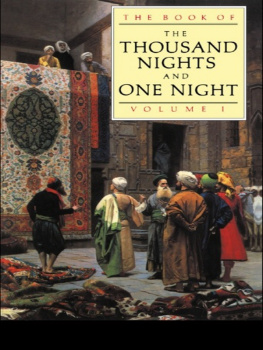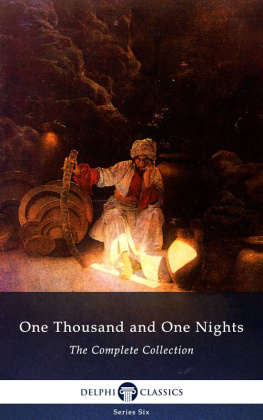Second edition 1964
First published as a paperback in 1986
by Routhuledge & Kegan Paul plc
Routledge is an imprint of the Taylor & Francis Group
This edition published in the Taylor & Francis e-Library, 2004.
All rights reserved. No part of this book may be reprinted orreproduced or utilized in any form or by any electronic,mechanical, or other means, now known or hereafterinvented, including photocopying and recording, or in anyinformation storage or retrieval system, without permission inwriting from the publishers.
ISBN 0-203-40760-1 Master e-book ISBN
ISBN 0-203-71584-5 (Adobe eReader Format)
ISBN 0-415-04539-8 (vol. I)
ISBN 0-415-04543-6 (set)
This revised edition of
The Book of the Thousand Nights
and One Night
is affectionately dedicated to
JACK ISAACS
who liked the work in its first
and more imperfect form
P.M.
The Book of
the Thousand Nights
and One Night
As Allah Wills!
In the Name of Allah
The Merciful, The Compassionate!
Praise be to Allah, master of the Universe! And prayer and peaceupon the Prince of Messengers, Muhammad our lord paramount!And upon all his people prayer and peace together for ever until thejudgment day!
And afterwards! may the legends of the men of old be lessons tothe people of our time, so that a man may see those things whichbefell others beside himself: then he will honour and considercarefully the words and adventures of past peoples, and will reprovehimself.
Also glory be to him who preserved the tales of the first dwellersto be a guide for the purposes of the last!
Now it is from among these lessons that the stories called TheThousand Nights and One Night are taken; together with all that
there is in them of wonder and instruction.
Note
For this revised edition of The Book of the Thousand Nights and One Night all names of persons and places and all Arabic words retained in the text have, where necessary, been compared with and corrected by Macnaghtens Calcutta Edition of the original (183942). As the object of the present translation was in the first place, and still is, to parallel Dr.Mardrus ideal of a simple and unannotated version of the complete work for the entertainment of the casual reader, the system of transliteration adopted here, though it gives a consistency lacking in my first edition and in the French of Dr. Mardrus, has been simplified almost beyond the approval of scholars. I have taken this course because I have been assured by experts on the subject that the Anglo-Saxon eye, when reading for pleasure, invariably shies at and side-steps any foreign word decorated with diacritical points or such sound-signs as (for ain) and (for aliph). The long vowels are marked in order that the reader may have some idea of the rhythm intended, but all other signs are omitted lest they should spoil his enjoyment of the text. Such a simplification allows, of course, of misunderstanding; it does not, for instance, show that Abu Ishak, Haruns musician, should be pronounced Is-hak; but such occasional losses seem, when we bear in mind the purpose of the translation, more than counterbalanced by the gain in ease of reading and to the eye.
P.M.
The Tale of King Shahryr and of hisBrother, King Shahzamn
IT is relatedbut All h is all wise and all knowing, all powerful and all beneficentthat there was, in the tide and show of ancient time and the passage of the age and of the moment, a king among the kings of S
h is all wise and all knowing, all powerful and all beneficentthat there was, in the tide and show of ancient time and the passage of the age and of the moment, a king among the kings of S s
s n, in the isles of India and China. He was master of armies and auxiliaries, of slaves and of a great following; and he had two sons, one tall and the other small. Both were heroic horsemen; but the taller was the greater in this exercise and reigned over lands and governed with justice among men, so that the peoples of the land and of the kingdom loved him. His name was King Shahry
n, in the isles of India and China. He was master of armies and auxiliaries, of slaves and of a great following; and he had two sons, one tall and the other small. Both were heroic horsemen; but the taller was the greater in this exercise and reigned over lands and governed with justice among men, so that the peoples of the land and of the kingdom loved him. His name was King Shahry r. The smaller brother was called King Shahzam
r. The smaller brother was called King Shahzam n and ruled over Samarkand al-Ajam.
n and ruled over Samarkand al-Ajam.
Both lived in their countries and were just rulers of the people for a space of twenty years; by the end of which time each was at the height of his splendour and his growth.
This was the way with them until the tall king was seized by a violent longing to see his brother. Then he commanded his Waz r to depart and return with him:and the Waz
r to depart and return with him:and the Waz r answered: I hear and I obey. The Waz
r answered: I hear and I obey. The Waz r set out and, arriving in all security by the grace of All
r set out and, arriving in all security by the grace of All h, entered the presence of the brother, wished him peace, and told him the purpose of his journey.
h, entered the presence of the brother, wished him peace, and told him the purpose of his journey.
King Shahzam n answered: I hear and I obey. Then he made preparations for his departure and for the going out of his tents, his camels, and mules; his slaves and fighting-men. Lastly he raised his own Waz
n answered: I hear and I obey. Then he made preparations for his departure and for the going out of his tents, his camels, and mules; his slaves and fighting-men. Lastly he raised his own Waz r to the governorship, and departed to seek the lands of his brother.
r to the governorship, and departed to seek the lands of his brother.
But, in the middle of the night, he recalled a thing which he had left forgotten at the palace. Returning and entering, he found his wife stretched on her bed and being embraced by a black slave. At this sight, the world darkened before his face and he said within his soul: If such a thing has come to pass when I have hardly left the city, what would the conduct of this wanton be if I were absent for long at my brothers house? So he drew his sword and with one stroke killed them upon the carpets of the bed. Then he returned and, ordering his camp to move forward, journeyed through the night till he came to his brothers city.
His brother rejoiced at his approach, went out to meet him and, greeting him, wished him peace; also he adorned the city for him, and began to speak with him jovially. But King Shahzam n remembered the affair of his wife, and a cloud of grief veiled him; his cheeks became sallow and his body frail. King Shahry
n remembered the affair of his wife, and a cloud of grief veiled him; his cheeks became sallow and his body frail. King Shahry r, seeing him in this pass and thinking it was due to his exile from lands and kingdom, questioned him no further on the subject and let him be. But, on a later day, he said: My brother, I know not! and yet I see your body grow frail and your cheeks sallow. Shahzam
r, seeing him in this pass and thinking it was due to his exile from lands and kingdom, questioned him no further on the subject and let him be. But, on a later day, he said: My brother, I know not! and yet I see your body grow frail and your cheeks sallow. Shahzam








 h is all wise and all knowing, all powerful and all beneficentthat there was, in the tide and show of ancient time and the passage of the age and of the moment, a king among the kings of S
h is all wise and all knowing, all powerful and all beneficentthat there was, in the tide and show of ancient time and the passage of the age and of the moment, a king among the kings of S r to depart and return with him:and the Waz
r to depart and return with him:and the Waz